The coordinating body of the Evangelical Lutheran Church in America (ELCA) has publicly rejected past statements attributed to early Lutheran church reformers and expressed “its deep and abiding sorrow and regret for the persecution and suffering visited upon the Anabaptists during the religious disputes of the past.”
The Church Council, which met last week, is the ELCA’s board of directors and serves as the legislative authority of the church between churchwide assemblies. It will next convene from 6-11 August 2007.
The council acted because past statements have become problematic for the ELCA’s present-day relationships with the Mennonite Church USA and other Christians who trace their heritage to the 16th century Anabaptist reformers, according to the council’s background materials.
In the action, the council declared that the ELCA “repudiates the use of governmental authorities to punish individuals or groups with whom it disagrees theologically.”
It rejected the arguments of Martin Luther and Philip Melanchthon, two 16th century church reformers, “in which they hold that governmental authorities should punish Anabaptists for their teaching,” the action said.
The council’s action repudiated similar statements in the Formula of Concord and declared that condemnations in the Augsburg Confession directed at the Anabaptists do not apply to today’s Mennonite Church USA. The Formula of Concord and Augsburg Confession are among the Lutheran confessions written in Europe in the 16th century.
Finally, the council said condemnations in the Augsburg Confession related to Anabaptist baptismal faith and practice and participation in the police power of the state “are properly the subject of future conversation between our churches.”
The Rev Joseph G. Crippen, chair of the council’s program and services committee, Northfield, Minnesota, introduced the proposal to the council.
“This is incredibly well done and has been received well by the Mennonite Church,” he said. “We have to honour our confessions, but we have new realities we have to address.”
“The purpose of the declaration is, first, to apologize for the persecution of the Anabaptists who are the forebears of the Mennonite Church in the USA and around the world, and also to acknowledge that the situation of the 16th century no longer applies in the 21st century,” said the Rev Randall R. Lee, executive, ELCA Ecumenical and Inter-Religious Affairs, in an interview with the ELCA News Service.
“The condemnations that are contained in the Lutheran confessions may have been very important at that time, but have receded in their importance for this time and in the future.”
Lee explained that the importance of the declaration now is that it will provide a foundation for international conversations between the Lutheran World Federation and the global Mennonite community. “Our action will provide energy to that conversation in the hopes of furthering our work together,” he said.
The Rev Mark S. Hanson, ELCA presiding bishop, added that the council’s action reflects “wonderful, collaborative work” that will move the ELCA forward ecumenically while it retains its integrity as a confessional church.
There have also been global talks between Mennonites and Roman Catholics recently. In the 1980s there was a dialogue between Mennonite representatives and the Church of England.
During the Reformation Anabaptists, who dissented both from Catholicism and state Protestantism, were harassed, imprisoned and killed for their beliefs – including freedom of religious profession, believers’ baptism, holding goods in common and non-resistance.
Today Mennonites, along with Quakers and the Church of the Brethren, constitute the ‘historic peace churches’, and are well known for their witness to the way of Jesus, nonviolence and biblical patterns of social justice.
There is one Mennonite congregation in the UK, at Wood Green in North London. But Mennonite ideas have been influential through the work of the London Mennonite Centre and the Anabaptist Network UK.
LMC’s book service, Metanoia, works in partnership with Ekklesia. All are linked through the Root and Branch Network.

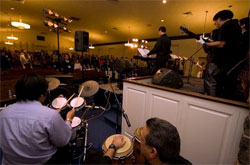 I have attended many conference assemblies over the past 45 years, most of them actually in other Mennonite conferences. Sometimes I was the moderator, sometimes I waited with bated breath to see if there would be any time for me as a church-wide staff person to report on the denominational work I was employed to do. This time I attended as a part-time staff person, no longer in the leadership loop. I went like most other delegates, not sure what would take place, and to some extent waiting to be proved it was worth my time to be there. To be sure I had a couple of particular responsibilities, so others may find it hard to believe I had any sense of being outside the loop. But too a degree I saw the Assembly from another vantage point. And I came away pleased and positive about the whole experience. Maybe you expected me to say that. But I honestly did not know what to expect.
I have attended many conference assemblies over the past 45 years, most of them actually in other Mennonite conferences. Sometimes I was the moderator, sometimes I waited with bated breath to see if there would be any time for me as a church-wide staff person to report on the denominational work I was employed to do. This time I attended as a part-time staff person, no longer in the leadership loop. I went like most other delegates, not sure what would take place, and to some extent waiting to be proved it was worth my time to be there. To be sure I had a couple of particular responsibilities, so others may find it hard to believe I had any sense of being outside the loop. But too a degree I saw the Assembly from another vantage point. And I came away pleased and positive about the whole experience. Maybe you expected me to say that. But I honestly did not know what to expect.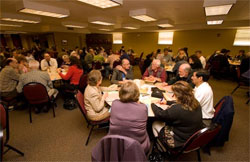 A second observation arises from the so-called “business session†Saturday morning. To my recollection only one decision was made, and that to update our Conference by-laws. I can anticipate some people wondering if it was worth being together with no hot issues that resulted in divisive debate and strenuous efforts to reach consensus. I well remember the days when Assembly was accorded a high mark for generating lots of heat, if little light. This session was such a contrast. There was focus on important agenda, most of it dealt with the future rather than the past, and was done in a positive spirit. At least that is how I experienced it, and I am aware my stance as a staff person hardly makes me unbiased. I do know where my check comes from! But it is worth noting we have moved from the old paradigm of tedious reports and fruitless debate to focused direction-setting for the future. I for one am glad.
A second observation arises from the so-called “business session†Saturday morning. To my recollection only one decision was made, and that to update our Conference by-laws. I can anticipate some people wondering if it was worth being together with no hot issues that resulted in divisive debate and strenuous efforts to reach consensus. I well remember the days when Assembly was accorded a high mark for generating lots of heat, if little light. This session was such a contrast. There was focus on important agenda, most of it dealt with the future rather than the past, and was done in a positive spirit. At least that is how I experienced it, and I am aware my stance as a staff person hardly makes me unbiased. I do know where my check comes from! But it is worth noting we have moved from the old paradigm of tedious reports and fruitless debate to focused direction-setting for the future. I for one am glad.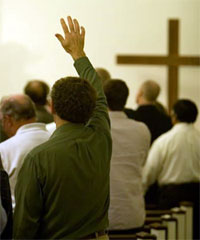 Given the high degree of transition we are in as staff in Franconia Conference, and the occasional rumbles from the churches about where everything is going, I need to say I was impressed with the quality of leadership at the Assembly, and the very positive spirit among the delegates. I missed singing hymns, only one to my count. Others may have had more substantive disappointments. But we are finding our way around the missional emphasis as we navigate into the 21st century and it won’t be like previous Assemblies; maybe never again. But the same God that led us in the past will continue to lead us into the future. And for that I am grateful and want to praise God.
Given the high degree of transition we are in as staff in Franconia Conference, and the occasional rumbles from the churches about where everything is going, I need to say I was impressed with the quality of leadership at the Assembly, and the very positive spirit among the delegates. I missed singing hymns, only one to my count. Others may have had more substantive disappointments. But we are finding our way around the missional emphasis as we navigate into the 21st century and it won’t be like previous Assemblies; maybe never again. But the same God that led us in the past will continue to lead us into the future. And for that I am grateful and want to praise God.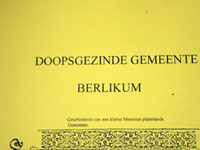 I am getting to know a wonderfully-alive Dutch man we’ll call Aert. Aert is a middle-aged school teacher who lives in the northern province of The Netherlands called
I am getting to know a wonderfully-alive Dutch man we’ll call Aert. Aert is a middle-aged school teacher who lives in the northern province of The Netherlands called  All of this makes me want to learn more languages, and it also inspires me to learn how to live what I speak. I have a long way to go….
All of this makes me want to learn more languages, and it also inspires me to learn how to live what I speak. I have a long way to go….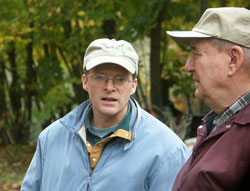 Editors note: Broome County, New York, particularly the Binghampton area is the home of numerous persons who attend Franconia Conference’s Lakeview congregation in Susquehanna County, PA.
Editors note: Broome County, New York, particularly the Binghampton area is the home of numerous persons who attend Franconia Conference’s Lakeview congregation in Susquehanna County, PA.
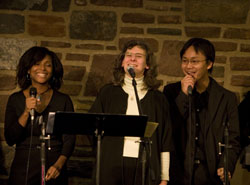 Anna Musselman, minister of church programs at Salford Mennonite Church, told her congregation that the walls of their historic meetinghouse would hear new songs and sounds during the Franconia Conference Fall Assembly held at the church on November 10-11 near Harleysville, PA. Musselman was right. Praises rang out for 24-hours with words spoken in Indonesian, Spanish, and Vietnamese (the worshipping languages of the conference’s congregations) while leaders gathered to celebrate, discern and learn.
Anna Musselman, minister of church programs at Salford Mennonite Church, told her congregation that the walls of their historic meetinghouse would hear new songs and sounds during the Franconia Conference Fall Assembly held at the church on November 10-11 near Harleysville, PA. Musselman was right. Praises rang out for 24-hours with words spoken in Indonesian, Spanish, and Vietnamese (the worshipping languages of the conference’s congregations) while leaders gathered to celebrate, discern and learn.